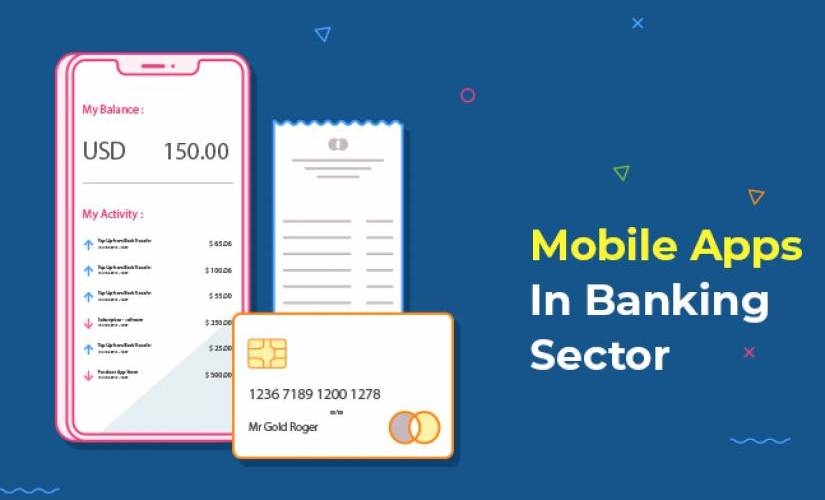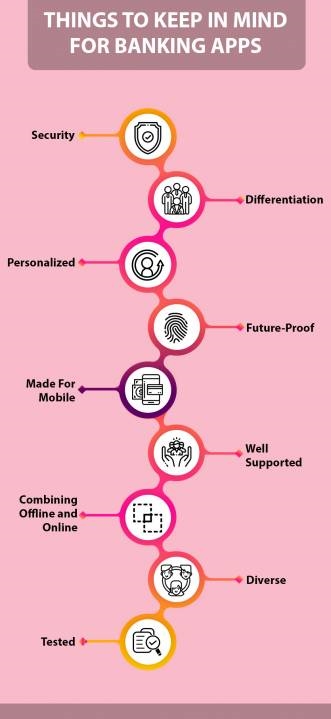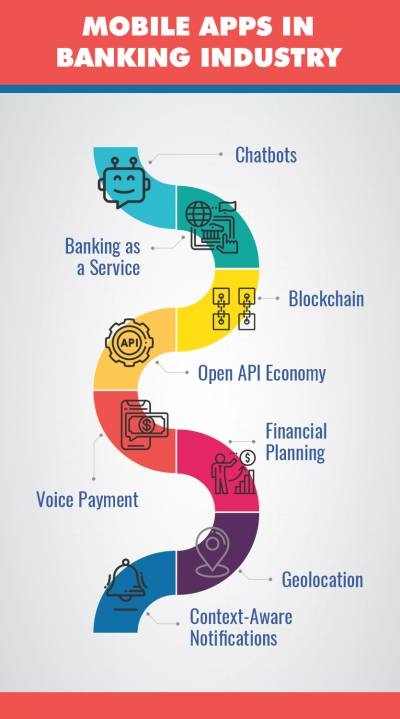Revolutionizing the Banking Sector with Next Level Mobile Apps
Revolutionizing the Banking Sector with Next Level Mobile Apps

Gone are the days when banking was time taking and full of unnecessary hassles. It’s the time when you can perform several significant actions through your smartphone. We are looking at a change in the healthcare and banking industry. Technological disruption has impacted most business domains. Here is how technology is revolutionizing the banking sector with next-level mobile apps.
The exponential growth in the number of mobile users in the past few years has gradually led to the increasing popularity of mobile banking apps.
Gone are the days when banking was time taking and full of unnecessary hassles. It’s the time when you can perform several significant actions through your smartphone. From going paperless to making ultrafast transactions, mobility has taken a new form and has enabled almost all banking actions performable on smartphones, computers, and tablets.
Now people prefer making transactions through popular banking apps like Google Pay, BHIM, or any other rather than the traditional way of banking that is visiting the nearest branch. Moreover, now, with the help of apps, people don’t even need to stop by an ATM or keep carrying a debit/credit card for making purchases.
The banking apps have given birth to digital money or smart money. Now anyone can transfer cash between mobile devices, and soon the mobile banking will become as common as internet banking. These mobile applications have also enabled contactless payments using Android, Windows phone, or iOS. And that has led to the growing demand for mobile app developers and bank application developers.
However, building an app for banking is way more complicated and riskier than other apps development. A developer needs to be extra cautious while building a banking app.
Fundamentals Pillars to Keep in Mind While Developing an App for Banking

Security.
When it comes to mobile banking app development, security might well appear as a matter of common sense. However, mobile apps qualifying as front-runners in the use of security features are not prevalent in the banking industry. Moreover, it’s hardly about the app’s code. If you don’t personally pick the mobile banking app developing experts for your app development, discussions with your developer must stress the need for security.
Although an app may ostensibly be unbreakable after it’s been released but when the app isn’t in direct control, you what kind of coding practice does the team members follow. Any mistake by a team member could invite weakness in banking app security. Now, this isn’t a typical scenario, but since millions of users are at stake, you must be extra cautious about Data Security.
Competitively differentiated.
Be it a small bank or a big; every bank has a few competitors in the market. If your competitors have apps, then it’s a must for you to have an app with similar functionalities. However, if you wish to have any competitive edge, you need to go the extra mile. The extra mile here means to have at least one feature more from your side to your customers.
Yes, you can do a lot of other things, add several new features but that may cost you a substantial amount. You need to take the middle path. Just have an app with all the features that your competitors’ apps have and then finally add one more unique element to your app for being one step ahead of your competitors.
Personalized.
Of course, copying the competitors with at least one more feature will get you a functional app. However, it’s your customers who should get prioritized. And they need a fantastic user experience. There are several ways through which you can gather your users’ demographics and preferences.
The best approach here is to personally reach out to users who are most active and ask them about what else can be done to improve the UX of the app. It’s advisable not to initiate your mobile banking app development without researching the needs and wishes of your users.
Future-Proof.
If you have gathered all the information regarding security and other technical requirements and have compiled a list for your app more than a few months ago, chances are it’s already outdated. Thousands of security breaches occur every year in the world. Hackers and breachers are always on the lookout for bugs and errors.
As Artificial Intelligence is also around the corner, new ways of hacking can also enter the domain. You need your application to be future-ready, and so you need to think a few months forward to the current situation.
Made for mobile.
If your banking app is a lot similar in functionality, UI, and overarching logic to your bank’s main website, then you may struggle to remain competitive. People download apps mostly because they want an authentic mobile experience. They want to manage their money conveniently and with a minimum effort of making swipes and taps.
Branding should be the only commonality between your website and your mobile app. Everything else should be simplified, minimized, as well as decluttered. That’s why it is called an application. It has a specific reason for existence and merely serving as an extension to your website, and an extra access-channel to your online banking service can limit the potential value of your application.
Supported.
Even after all the careful planning as well as execution, there can be times when your users are going to be get confused by your app, and for several customers, your app might be the bridger between your bank and them. For anyone who would need immediate assistance from your side, this is an essential feature that every banking app needs.
However, there are many ways to provide a support channel for your users within your application. For instance, several Traits Of Fintech Apps now leverage chatbots to provide essential automated assistance. You also need to make sure that the support option is easy to find and use. Preferably no more than a few taps should be required. Otherwise, out of frustration, people might hop on to your website to get assistance.
Combining Offline and Online.
Among the plethora of possible in-app banking features, those with a mix of both online and offline features are the ones who stand out from the crowd. Any useful functionality that can be used in the offline mode as well is likely to give your app an upper hand against the competitors.
You might try to use progressive web development to allow your app to have some offline features.
Diverse.
Now have a look at your users and check what platform are they using. There must be many android users, iOS users, and even Windows users. With such a diversity of platforms to consider, you have to pay extra attention to hardware requirements. Some features that might be running smoothly on iOS may not be running equally smooth on Android and Windows phones.
To cope up with such situations, you need to have a cross-platform banking application, in case you can’t build a specific app for every platform. Also, do take care of the overall size and hardware requirements of the apps. It’s better to build an app that’s simple and minimalistic.
Tested.
Last but not least, apps must undergo several testing before getting launched. However, if it’s a banking app, it requires even more rigorous testing. Before launching your banking app, makes sure that you have tested all the features on various platforms, and it has passed all the tests profoundly. After all, it’s about millions of users.
Now that you about all the pillars of mobile banking app development, you need to know how these kinds of next-level apps are revolutionizing the banking industry.
How Are The Next Level Mobile Banking Apps Revolutionising The Banking Industry?

Chatbots.
Nearly all the banking apps provide its users with the facility of chatbots. Chatbots are allowing banks to effectively communicate with thousands of users at once in a user-friendly manner. The best part is chatbots can leverage Artificial Intelligence as well as predictive analytics to enable users to make better decisions.
Additionally, chatbots also provide customers with instant support services and help users to offset debts, check balances, make various payments, and minimize expenses.
Banking-as-a-Service.
Banking-as-a-Service allows services beyond the regular working hours and outside the original banking building. Institutions in the banking sector are gradually becoming better and more flexible by integrating technology along with banking operations, by primarily sharing expert knowledge.
With Banking-as-a-Service, banks can scout for excellent services and leverage on them to provide the users with the bank’s services and products. All this is possible because of artificial programming interfaces. Sharing of latest technology, knowledge, and openness has allowed the banking industry not only to scale up their workings and operations but also get better access to improved and new features.
Blockchain.
Despite all the strict jurisdictions and regulations around the banking sector, the financial institutions have already started to realize the real potential of blockchain technology after witnessing the popularity of cryptocurrencies in the present market. The giant players in the banking industry have begun to conduct tests for understanding the possible use cases of this decentralized technology for improving their business operations and processes.
Moreover, several organizations have also started to invest in such research heavily and even on the tests conducted by startups to build blockchain-based solutions. With blockchain making the first step in the current banking scenario, several problems could be solved while making the system more straightforward and transparent.
Open API economy.
People have started to become technology savvy, and that’s why they expect the same from the banks as well. We had passed the time when app development agencies developed simple applications that’s able to provide just the traditional plus simple features and services. Nowadays, the latest applications offer advanced features and value-added services in applications either independently or simply by working with the financial technology service providers.
Accelerated Programming Interfaces (API) has made it all possible. APIs allow secure, efficient, and reliable data sharing between systems. As a result, building new applications or incorporating new features to an existing application has become way more comfortable for app development companies than it was ever before. Providing value-added services, as well as products in your mobile banking application, can offer your customers greater flexibility and several features, and this increases the overall frequency of transactions.
Voice payment.
It’s no longer just about “Hello Google,” but it is also going to enter the banking industry. Voice banking is gradually finding its way towards the banking industry. Royal Bank of Canada and Barclays are standing at the forefront in the quest to adopting this technology. Basically, now Google Assistant and Siri will be able to pay your bills, make transactions, check the balance for you on just one command of yours.
Financial planning.
Budget planning and management are among the top concerns for many. While there are many separate apps for the same but as bankers are a trustworthy source of knowledge regarding budget management, this is a big plus for banking applications. This would easily make the mobile app an all in one solution. However, if you want to make an app for your business, then you should have an idea of the budget. That’s where knowing the cost to make an app is of prime importance.
A mobile app with a financial planning feature can help users to make sound business decisions, plus it can also provide tips for thoughtful management, improve investments, increase savings, and so many more. In the long run, it could also help banks to have a loyal user base that is an essential aspect for banks for sustainability.
Geolocation.
Where’s the nearest ATM? Does it have cash and would the trip be worth it? These are some of the most common questions among the users. Now think about if your app can help in answering all these questions? Wouldn’t it be an extra feature to lure users? Of course, it would be. With the geolocation feature in your app, you could answer all such questions for your users and allow them to be happier and loyal to your bank.
Context-Aware notifications.
While these features are very much popular among the digital marketing sector, adding context-based notifications to banking apps might be a little tricky considering the privacy and security issues. However, if executed in the right manner, this could be the next big thing in the mobile banking industry. Will the trend that would take personalization to another level?
Conclusion
The banking industry or any other, the relationship between the business and its customers is what decides the success of the company? The link is longer dependent on the bank building, employees or any other thing, but instead it’s primarily dependent on the adoption of advanced mobile technology. More than 40% of the people on the planet actively use smartphones.
Additionally, approx 4 billion people globally use the internet actively to buy as well as sell commodities, pursue education, access banking services, and network with other people. Now if your bank isn’t leveraging the real power of mobile banking to step up their game, you’re leaving a significant amount on the table.
As more and more banks have started to leverage it and reap the benefits, the game is undoubtedly becoming competitive. And now is the right time to enter the lane and make your bank technologically advanced. Moreover, as the number of mobile and internet users is whopping, mobile apps can transform the banking sector exponentially in the next few years.
The post Revolutionizing the Banking Sector with Next Level Mobile Apps appeared first on ReadWrite.
(86)

